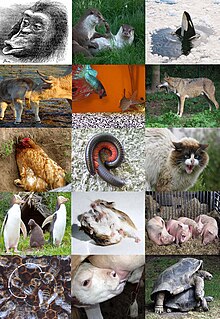Ethology
The ethology (from the Greek ηθος, ethos, «custom», and λóγος, logos, «reasoning, study, science») It is the branch of biology and experimental psychology that studies the behavior of animals in their natural environments, in a situation of freedom or in laboratory conditions, although field studies are better known. By traditionally studying behavior in the natural environment, ethological research is usually distinguished from behavioral research, while the latter focuses on the artificial or laboratory environment, although its object of study is the same and they only differ in the method with which it is carried out. they study.
Scientists dedicated to ethology are called ethologists and study the distinctive behavioral characteristics of a given group and how these evolve for its survival in a given environment. Its object of study is animal behavior in its interaction with the environment. Human beings, as animals, are part of the field of study of ethology. Some authors call this specialization "human ethology", expressly differentiating it from psychology or sociobiology.
The objectives of ethologists are the study of behavior, instinct and relationships with the environment, as well as the discovery of the guidelines that guide the innate or learned activity of different animal species. Thus, ethologists study aspects such as aggressiveness, mating, behavioral development, social life, imprinting, and many others in animals.
Definitions of ethology
There is a certain tendency, within ethology, to avoid a formal definition of it, and the existing definitions are broad and ambiguous. Some of the definitions of ethology are as follows:
- 1951 - Nikolaas Tinbergen: "Objective study of behavior (later, biological study of behavior)".
- 1979 - Irenäus Eibl-Eibesfeldt: "Comparative study of behavior".
- 2009 - Manuel Soler: "The ecology of behavior (originated by the adaptive approach of ethology) has achieved such a marked prominence that it can be considered as modern ethology".
History of ethology
At the beginning of the 20th century, comparative psychology was created, which consisted of the study of the behavior and psychological capacities of different animal species and which, in this sense, considered human behavior as one of the many types of animal behavior. Behaviorists use this method in their studies, but after 1973, when scientists Konrad Lorenz, Karl R. von Frisch and Niko Tinbergen received the Nobel Prize for their studies on animal behavior, ethology began to be considered a science. with full rights and comparative psychology was integrated into this new science.
In Europe, animal behavior research developed with an emphasis on field studies and instinctive behaviors. We must highlight some of the most brilliant ethologists: Konrad Lorenz, with his study on imprinting in geese; Karl von Frisch, focused on the communication system of bees, and Niko Tinbergen, interested in the study of instinct in the stickleback fish. In the United States, during the first half of the 20th century, animal behavior research focused on behaviors learned in controlled environments. These investigations gave rise to comparative psychology and behaviorism.
In 1951, Niko Tinbergen published The Study of Instinct (The study of instinct), where he raised the four questions on which ethology (causational, development or ontogenetic, evolution and phylogenetic) and makes a distinction between comparative psychology and ethology. In 1966, Robert Hinde made a synthesis of the two and distinguished the most outstanding aspects of each one.
Ethological studies
The four ethological whys:
Causes
Attempts to find out the direct cause of the behavior. We can make a dichotomy here on the subject:
- Internal Cause.
- External cause.
Internal cause is an open box model, it attempts to explain the cause at a physiological level. The external cause tries to answer the question of what external cause has triggered the ethological response, as if it were a closed box model, without worrying about the physiological reason.
Development
Tries to find out the behavior of the human organism, caused by the previous situations or causes made by animals.
Evolutionary
Attempts to answer what benefits the animal obtains from a behavior and what evolutionary advantages it has had for it to be selected. For example, what evolutionary advantage does a hen gain from caring for her young and not abandoning them?
Phylogenetic
Attempt to answer the question "When did this behavior appear in the evolutionary history of the species?"
Innate and learned behaviors
Another problem that ethology addresses is whether a behavior has a genetic basis or is learned. For decades, many ethologists—including Konrad Lorenz—proposed that behavior was either innate or learned. Instead, other scientists from the branch of psychology and others from different branches affirmed that behaviors could have characteristics of both types. Finally, it was concluded that, although a factor is innate or learned, in many cases it has part of both: it requires learning or innate knowledge for its correct development.
The existence of a conscience in animals
Ethology also addresses the problem of demonstrating the existence of consciousness in animals.
On July 7, 2012, prominent scientists from different branches of neuroscience gathered at Cambridge University for the Francis Crick Memorial Conference, which discussed the existence of the consciousness in human and nonhuman animals. At the end of the conferences, the Cambridge Declaration On Consciousness was signed in the presence of Stephen Hawking, summarizing the most important findings of the research presented and discussed there.:
"We decided to reach a consensus and make a statement for the non-scientific public. It is obvious to all in this room that animals are aware, but it is not obvious to the rest of the world. It is not obvious to the rest of the Western world or the distant East. It's not obvious to society."Philip Low, in the presentation of the Cambridge Declaration on Consciousness, July 7, 2012
Some studies have reported high levels of consciousness in some non-human animal species, compared to human levels.
Contenido relacionado
Deciduous
Carl Gustav Jung
Biotechnology
